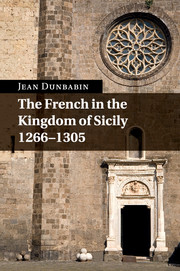Book contents
- Frontmatter
- Contents
- Acknowledgements
- List of abbreviations
- Genealogical tables
- Introduction
- Part I Means of communication
- Part II Indirect channels of communication
- Part III Settlers in the Regno
- 5 Robert II d'Artois
- 6 The Dampierres, the comital family of Flanders
- 7 Other French aristocratic families
- 8 Foundations and degrees of French aristocratic commitment to the Angevin regime in the Regno
- 9 The French experience in the Regno
- Part IV Cultural and political impacts
- Bibliography
- Index
8 - Foundations and degrees of French aristocratic commitment to the Angevin regime in the Regno
Published online by Cambridge University Press: 03 May 2011
- Frontmatter
- Contents
- Acknowledgements
- List of abbreviations
- Genealogical tables
- Introduction
- Part I Means of communication
- Part II Indirect channels of communication
- Part III Settlers in the Regno
- 5 Robert II d'Artois
- 6 The Dampierres, the comital family of Flanders
- 7 Other French aristocratic families
- 8 Foundations and degrees of French aristocratic commitment to the Angevin regime in the Regno
- 9 The French experience in the Regno
- Part IV Cultural and political impacts
- Bibliography
- Index
Summary
This chapter attempts to explain at least in part the nature of the cement that kept northern French support for Charles I and Charles II firm for about forty years. It also describes what those kings did to reinforce it. The difficulty of establishing the causes of adhesion to the Angevin cause lies principally in the absence of direct evidence from the mouths of Angevin supporters. One or two recruiting songs (to be discussed in Chapter 17) demonstrate what jongleurs or their patrons thought might appeal to would-be participants in the campaign – the chance to earn spiritual reward and earthly glory. Whether these were actually the prime motivations of those who went to fight we cannot be absolutely sure. Almost all of their sentiments have to be deduced from their actions, and this necessarily involves considerable interpretation. Nevertheless, the issue is so important that it seems worth attempting to clarify it.
Before turning exclusively to the aristocracy, it is useful to ask how much broad support across northern France there was for Charles of Anjou's conquest and the continuity of Angevin rule, among those who had no intention of ever going to the Regno in any capacity. It would be very valuable to know to what extent those debarred from fighting by sex, age, weakness, or heavy responsibilities at home, thought fit to encourage others to fight.
- Type
- Chapter
- Information
- The French in the Kingdom of Sicily, 1266–1305 , pp. 155 - 170Publisher: Cambridge University PressPrint publication year: 2011

